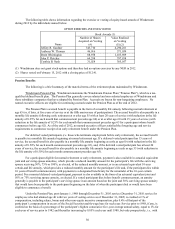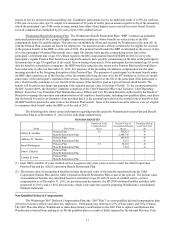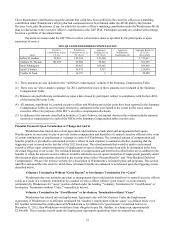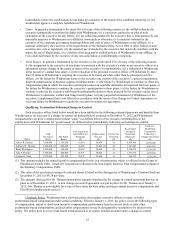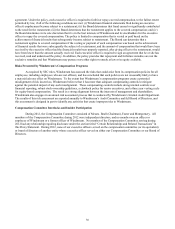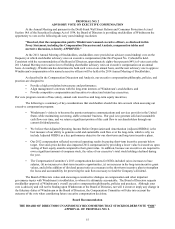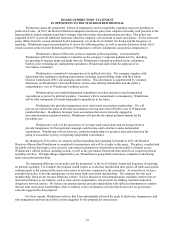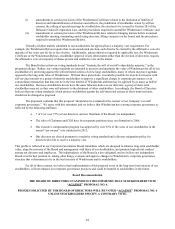Windstream 2012 Annual Report Download - page 40
Download and view the complete annual report
Please find page 40 of the 2012 Windstream annual report below. You can navigate through the pages in the report by either clicking on the pages listed below, or by using the keyword search tool below to find specific information within the annual report.of any medically demonstrable physical or mental condition, excluding, however, incapacity resulting from a felonious
enterprise; chronic alcoholism or addiction to drugs or abuse; and self-inflicted injury or illness.
Change-in-Control
Windstream does not maintain any plans or arrangements that would provide benefits to the NEOs solely as a result
of a change-in-control (a single trigger).
Change-in-Control Agreements. Effective January 1, 2013, Windstream entered into a new form of change-in-
control agreement to replace and supersede the prior change-in-control agreement with its executive officers, including the
NEOs. The terms of the current form of change-in-control agreement are generally the same as the prior form of change-in-
control agreement, except that the new form of change-in-control agreement eliminates the tax gross-up provision applicable
under certain circumstances under agreements entered into prior to 2009. The current form of change-in-control agreement
does not provide for a gross-up payment to any of Windstream's named executive officers to offset any excise taxes that may
be imposed on excess parachute payments under Section 4999 of the Internal Revenue Code. Instead, under the current form
of change-in-control agreement, if such excise taxes would be imposed, the executive will either receive all of the benefits to
which he or she is entitled under the agreement, subject to the excise tax, or have his or her benefits under the agreement
reduced to a level at which the excise tax will not apply, depending upon which approach would provide the executive with
the greater net after-tax benefit.
Under the current change-in-control agreement, a covered executive would be entitled to certain severance benefits
if, during the two-year period following a change-in-control (as defined below), Windstream terminates the executive’s
employment without “cause” (as defined below) or the executive terminates his or her employment with Windstream for
“good reason” (as defined below). In general, the executive officers would be entitled to receive, in a lump sum paid by
Windstream or its successor, the following amounts pursuant to the change-in-control agreements:
• Three times for Messrs. Gardner, Thomas, Whittington and Fletcher and two times for Ms. Nash the sum of the
executive’s base salary and target annual incentive compensation (in each case, as in effect on the date of the
change-in-control, or if higher, on the date of termination);
• Pro-rated amount of target annual incentive compensation for the year of termination;
• A cash equivalent for three years for Messrs. Gardner, Thomas, Whittington and Fletcher and two times for Ms.
Nash of health care premiums; and
• Outplacement services with a value of no more than $50,000 for Messrs. Gardner, Thomas, Whittington and
Fletcher or $25,000 for Ms. Nash.
Terminated executives are prohibited from soliciting employees or customers or competing against Windstream or
the acquiring or successor entity for a one-year period and are subject to a confidentiality restriction. Moreover, a terminated
executive is required to sign a release of all claims against Windstream and the acquiring or successor entity prior to
receiving severance benefits under the change-in-control agreement.
The Compensation Committee believes these benefits are consistent with market practice and fit into the overall
compensation packages to sufficiently attract and retain talent. Windstream is protected by the non-competition provisions of
the arrangements and by having these benefits, senior executives are not discouraged from pursuing the best alternative for
long-term value for shareholders, which might include potential change-in-control transactions.
Accelerated Vesting of Restricted Shares. All unvested restricted stock or performance-based restricted stock or
units held by the named executive officers listed above would have become vested if a change-in-control (as defined below)
occurred on December 31, 2012 and Windstream terminated the executive’s employment without “cause” (as defined below)
or the executive terminated his or her employment with Windstream for “good reason” (as defined below) following such
change-in-control.
Definitions. For purposes of the Change-in-Control Agreements and the restricted shares described above for all
executive officers, the following terms have the meanings set forth below:
•Change-in-control. A change-in-control generally means any of the following: (i) an acquisition of 50% or more of
Windstream’s Common Stock; (ii) a change in the membership of Windstream’s board of directors, such that the
current incumbents and their approved successors no longer constitute a majority; (iii) a reorganization, merger,
consolidation or sale or other disposition of more than 50% of Windstream’s assets in which any one of the
following is true: Windstream’s pre-transaction shareholders do not hold at least 50% of the combined enterprise;
there is a 50%-or-more shareholder of the combined enterprise (other than as a result of conversion of the
shareholder’s pre-combination interest in Windstream); or the members of Windstream’s board of directors
34








